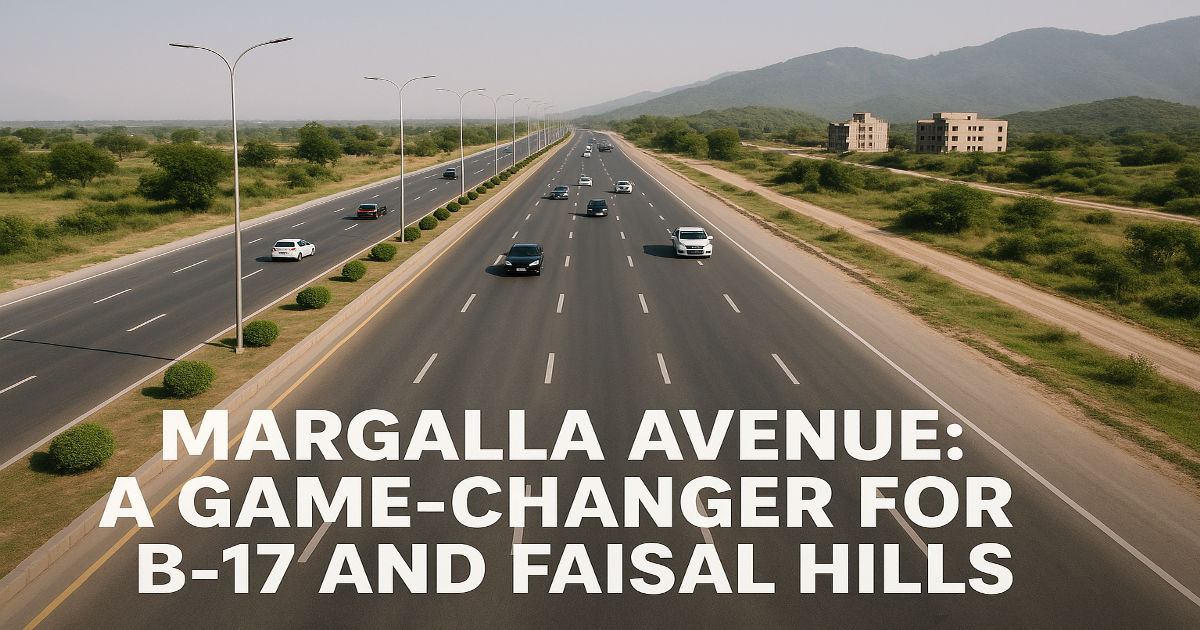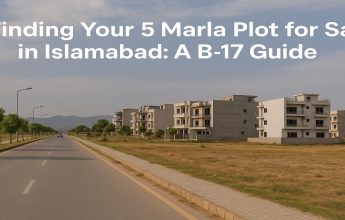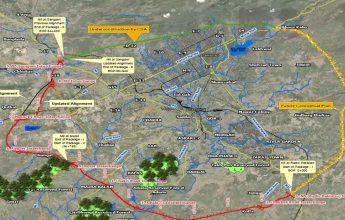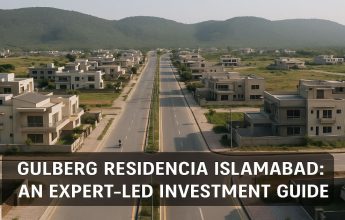Margalla Avenue: A Game-Changer for B-17 and Faisal Hills

The development of new Islamabad infrastructure is often the catalyst for significant growth in surrounding areas, and the completion of Margalla Avenue stands as a prime example. Constructed according to international highway standards under NDMA and CDA oversight, this major artery is not just another road; it represents a new era of commuter connectivity and opportunity for residents and investors in Islamabad’s Zone II. For communities like B-17 and Faisal Hills, this project is a transformative development, promising to enhance daily life, improve accessibility, and unlock considerable real estate appreciation.
Based on reports from the Capital Development Authority (CDA) and several leading Pakistan real estate analysts, Margalla Avenue is already reshaping market dynamics and residential trends in Islamabad. This article explores its wide-ranging benefits, supported by data analysis and on-ground insights. You will find perspectives from urban planners and property market specialists, as well as references to published real estate reports, so you can make decisions with confidence.
Redefining Connectivity for Commuters
For years, residents of B-17 and Faisal Hills faced long and often congested daily commutes to reach the heart of Islamabad. The reliance on GT Road as the primary access point created daily bottlenecks, adding significant travel time and stress. As noted in a 2023 study by the Islamabad Traffic Police Department, congestion on major routes often added 30–45 minutes to a typical commute. The introduction of Margalla Avenue directly addresses this challenge by providing a streamlined, alternative route. This new road links these housing societies directly to key sectors of the capital, including the E-11, D-12, and F-series sectors, effectively cutting down daily travel times.
This improved traffic flow means less time on the road and more time for family, work, and leisure. The avenue’s direct link to the Srinagar Highway further boosts accessibility, creating a seamless travel experience for thousands of daily commuters. This development is a practical solution to a long-standing issue, making these communities far more attractive for professionals and families working in central Islamabad. Transportation experts from the CDA affirm that traffic volume distribution has improved since the road’s completion, also helping to reduce accidents related to congestion.
A Direct Link to Islamabad’s Core Hubs
The strategic alignment of Margalla Avenue offers more than just reduced travel time; it provides direct access to Islamabad’s commercial, educational, and healthcare hubs. Before its construction, reaching these essential facilities required navigating through heavy traffic on GT Road and other secondary routes. Now, residents can enjoy a much simpler journey.
This direct linkage brings several key advantages:
- Faster access to employment centers: Professionals can reach business districts and government offices more quickly, improving daily commute efficiency.
- Proximity to top-tier education: Families gain easier access to renowned schools and universities including Quaid-e-Azam University and Bahria University located in Islamabad’s established sectors.
- Improved healthcare access: Reaching major hospitals, such as Shifa International and Pakistan Institute of Medical Sciences (PIMS), in an emergency or for routine appointments becomes far more convenient.
This enhanced accessibility integrates B-17 and Faisal Hills more closely with Islamabad’s ongoing urban development, transforming them from peripheral societies into well-connected suburbs. Real estate consultants frequently cite accessibility to schools and healthcare as top decision factors for homebuyers, underscoring the importance of Margalla Avenue’s alignment.
Boosting Property Value and Investment Appeal
Infrastructure development is a proven driver of real estate appreciation. Data from Zameen.com and local real estate agencies show that property prices in B-17 and Faisal Hills have increased by up to 20% in the 12 months following the road’s partial opening. The increased commuter connectivity and convenience have already started to generate significant interest from both property investors and homebuyers. As accessibility improves, demand for properties in B-17 and Faisal Hills naturally rises, leading to a healthy increase in property value.
Investors who recognized the investment opportunities in these areas early on are now seeing substantial capital gains, as confirmed by market summary reports from leading Islamabad brokers. For new buyers, these communities offer a compelling opportunity to secure a valuable asset with strong, long-term growth prospects. The combination of modern amenities within these societies and superior external connectivity creates a powerful value proposition supported by real market performance. The development signals a secure and promising future, making it a prudent time to consider real estate opportunities in this corridor.
Enhancing Quality of Life and Community Living
A shorter and less stressful daily commute directly translates to a better quality of life. Urban development experts frequently highlight that improved transport infrastructure correlates with higher resident satisfaction and community well-being (Pakistan Urban Forum, 2022). With more free time, residents can engage in recreational activities, spend quality moments with family, and enjoy a more balanced lifestyle. The improved access to retail centers, restaurants, and entertainment venues in Islamabad means that the vibrant city life is no longer a distant luxury.
Moreover, the avenue is part of a broader Islamabad infrastructure initiative that encompasses green belts and planned commercial zones, enhancing both the aesthetic and practical environment. As these communities become more accessible, they attract high-quality schools, clinics, retailers, and services, which further raise living standards. The active presence of security patrols along the avenue adds a layer of safety that reassures families—an essential ingredient in any thriving community.
The Strategic Importance
The unique value of Margalla Avenue lies in its integration with Islamabad’s major highways. By connecting GT Road and the Srinagar Highway, it has established a multi-modal transportation corridor that benefits both local and regional travelers. Residents of B-17 and Faisal Hills now have ample choices for reaching Rawalpindi city, Islamabad International Airport, and E-11/F-10 areas for business or leisure.
Transport planning experts from NUST (National University of Sciences & Technology) have noted that this new linkage helps balance traffic loads across multiple routes, reducing overall congestion and minimizing commute times. It also opens business opportunities for logistics and retail outlets positioned along these arteries, intensifying the zone’s commercial appeal and supporting local employment.
Future Growth and Urban Development
The completion of Margalla Avenue represents a turning point in the long-term urban development strategy for Islamabad’s Zone II. According to projections by the Pakistan Planning Commission, the region is poised for an influx of new residential and commercial developments as a direct result of improved transportation infrastructure. International developers are already expressing interest in launching new projects, responding to the enhanced accessibility now available.
Residents can anticipate an ever-growing selection of lifestyle amenities and services, from parks and community centers to shopping complexes. Plans are underway to extend this corridor to the Rawalpindi Ring Road, further entrenching its importance in the greater Islamabad region and broadening its impact on interconnected neighborhoods.
Investment and Residential Growth
The ripple effects of Margalla Avenue extend well beyond mere convenience; indeed, it has become a reference point for secure and forward-looking investment. Moreover, recent market surveys show that families seeking well-planned, amenity-rich communities now prioritize B-17 and Faisal Hills, knowing that efficient commuter connectivity is in place. Consequently, community organizations have already reported a rise in neighborhood engagement and satisfaction.
For investors, the area offers a stable and potentially lucrative market. Rising rental demand, steady infrastructure upgrades, and professional property management combine to create a trustworthy investment environment. Guidance from experienced realtors and urban planning authorities further increases buyer confidence, reinforcing the area’s reputation for reliability and long-term growth.
Conclusion
The inauguration of Margalla Avenue marks a pivotal moment for the Islamabad infrastructure and real estate landscape, particularly for communities like B-17 and Faisal Hills. More than just a road, it is a lifeline that enhances commuter connectivity, reduces travel time, and significantly improves the quality of life for residents. Confirmed by data from local authorities and recognized by real estate experts, this project bridges the distance to Islamabad’s core and unlocks immense potential for real estate appreciation and new investment opportunities. For anyone considering a home or an investment in the capital, the strategic advantages offered by this new infrastructure make B-17 and Faisal Hills more appealing than ever. This urban development solidifies their position as premier destinations for secure, modern, and well-connected living.
Frequently Asked Questions (FAQs)
1. How much has Margalla Avenue reduced the commute time from B-17 and Faisal Hills to central Islamabad?
According to recent CDA and Islamabad Traffic Police data, the new route can reduce travel time by up to 30–45 minutes during peak hours, providing a much faster and more direct connection to core sectors like F-10, E-11, and the Blue Area compared to traditional GT Road routes.
2. How does Margalla Avenue impact property prices in Faisal Hills and B-17?
The improved accessibility and commuter connectivity provided by Margalla Avenue have led to a documented increase in property demand typically a 15–20% rise in residential values, according to Zameen.com and local brokers. Experts anticipate continued property appreciation as infrastructure expands.
3. Is the Margalla Avenue route safe for daily travel?
Yes. The road is built to modern safety standards and features proper lighting, surveillance, and designated crossings. Official security and maintenance protocols are enforced by the NDMA and CDA to ensure a safe and smooth travel experience.
4. What long-term benefits are expected from Margalla Avenue for B-17 and Faisal Hills?
Long-term advantages include lasting real estate appreciation, sustained investment opportunities, reliable access to urban amenities, and elevated quality of life, all endorsed by both market trends and urban planning authorities.
5. Are there plans to further extend Margalla Avenue for greater connectivity?
Yes. Official city masterplans and public updates confirm intentions to extend Margalla Avenue’s reach by linking to major arteries like Rawalpindi Ring Road, ensuring continued integration and development for the region.






